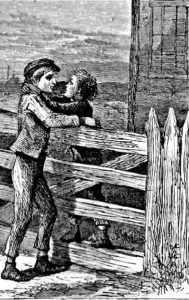Letter from an 19th Century American Traveler

(This definitely would be me if I lived in the mid 19th century and was a part of the upper class who could afford to wear this kind of clothing and be photographed dramatically. Bring back parasols!! Link 1 below.)
I write to you of my preparations for London:
And the great trip abroad approaches! As promised, I am to accompany my father and brothers on their business trip conducting trading negotiations—for me, it will of course be my first time traveling farther than 40 miles outside of Nantucket, the home I have known all my life. It certainly will be my first trip outside of America’s borders, though by sharing a common language with my own country, England will prove, I hope, far less foreign than its other European counterparts.
To prepare for my departure logistically and to best enjoy my voyage, I have been reading selections from “Bradshaw’s Illustrated Hand Book to London and its Environs.” I’ve taken note of his best advice, and though some of his guide seems based in fundamental good sense, still other aspects seem to warn against the most absurd problems and situations that I’d never have dreamed I’d need to prepare myself for. My brother laughs at my growing anxieties, as I was decidedly more optimistic about the coming journey before reading about some of the cautions that Bradshaw has included.
Bradshaw writes of the magnitude of London’s dense population with specific statistics that have overwhelmed my mind but proven ultimately unhelpful in my preparations. Indeed, Bradshaw assures his readers that though London is “all bustle and confusion,” he also presents the case of an “impartial” French resource, whose impressions of London evolved from hatred to deep respect (Bradshaw 18-19). Upon reading this, I first thought that perhaps such an account would not persuade American readers to visit the city, but the very same resource writes on lovingly about the city, which he says “contains in detail much to interest and be admired” (Bradshaw 20).
Bradshaw writes admiringly of London’s newest technologies, including the drinking fountains, street railways, and expansive telegraph communication system. However, he also cautions against several forms of unexpected evils that may befall the unsuspecting traveler. Nefarious individuals such as pickpockets, smugglers, and beggars plague the streets of London. For defense, Bradshaw recommends caution “in bestowing his indiscriminate charity” to beggars, as many merely pose and extort the position as a profession (19). Bradshaw also warns against the trouble caused by London’s infamous fog, the incessant noise of the streets, and the London mud that dirties the streets, endangering passers-by after rainfall occurs. We expect, from the guide, that the weather will be cool at worst, and hopefully more comfortable, although almost certainly rainy.
I have also supplemented this research by reading Charles Dickens’ “The Uncommercial Traveller,” a lovely collection of essays that deal with Dickens’ personal experiences and with the city of London at night. They feel very expository in nature, or at least make me feel as though I know a little more about London from the perspective of a true city-dweller. Dickens’ experiences in the essay titled “Night Walks,” deal with the working people of London, hidden away on out-of-sight streets at night, where no one, except our unsleeping narrator, might stumble upon them. Putting himself intentionally in their way, walking along the solitary path of “Houselessness,” Dickens sees what they see. He writes of disease, murder, and street crime, and finally of the scrappy children and sleepy shopkeepers that are only stirring when he finally begins to feel tired. When I first chose to read these essays, I did not expect them to affect me in the ways that they did—my heart broke upon reading this description of children living by their own means:
But one of the worst night sights I know in London, is to be found in the children who prowl about this place; who sleep in the baskets, fight for the offal, dart at any object they think they can lay their their thieving hands on, dive under the carts and barrows, dodge the constables, and are perpetually making a blunt pattering on the pavement of the Piazza with the rain of their naked feet (Dickens 10).
He laments that their growth is only possible because of the savage ways they secure their little lives. To be sure, reading these accounts gives me a proper appreciation for my station in life. I am honored to be visiting London, but saddened by the poverty that pervades such a wonderful city. Reading this passage has given me a heightened understanding of London’s lower class—one that I had not considered while planning our foreign excursion. What will be the hosting country of my holiday also houses these unfortunate souls that Dickens writes of. I thank him for this work of contemplative and almost journalistic thinking that has given me a greater context for my journey and a deeper gratitude for the privilege of my own life.
Finally, if I happen to survive the week’s journey across the Atlantic (despite living on an island, I have never enjoyed the practice of transport by boat and do not particularly await with joy the trip, which is sure to be long and tempestuous), I shall continue to document my travels beginning around the 25th of June, when we are expected to arrive in the docks of Liverpool(2). Dramatics aside—considering I arrive safely and with good humor intact, I fully intend to explore this beautiful and historical city that I have heard and read so much about.
—
Sources:
- Image: https://chriskresser.com/what-mid-victorians-can-teach-us-about-nutrition-and-health/
- Travel records: https://history.stackexchange.com/questions/23385/how-long-would-it-take-to-travel-from-the-united-kingdom-to-america-in-1890
Note: I cited from our edition of “Night Walks,” but I didn’t refer to it as that in the letter (I referred to it as “The Uncommon Traveller”), because I’m pretty sure it is a collection of essays put together more recently.
